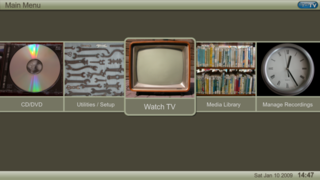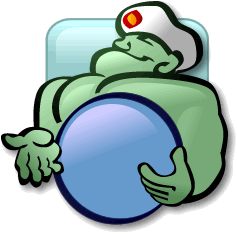Related Research Articles
RSS is a web feed that allows users and applications to access updates to websites in a standardized, computer-readable format. Subscribing to RSS feeds can allow a user to keep track of many different websites in a single news aggregator, which constantly monitor sites for new content, removing the need for the user to manually check them. News aggregators can be built into a browser, installed on a desktop computer, or installed on a mobile device.
TWiki is a Perl-based structured wiki application, typically used to run a collaboration platform, knowledge or document management system, a knowledge base, or team portal. Users can create wiki pages using the TWiki Markup Language, and developers can extend wiki application functionality with plugins.
On the World Wide Web, a web feed is a data format used for providing users with frequently updated content. Content distributors syndicate a web feed, thereby allowing users to subscribe a channel to it by adding the feed resource address to a news aggregator client. Users typically subscribe to a feed by manually entering the URL of a feed or clicking a link in a web browser or by dragging the link from the web browser to the aggregator, thus "RSS and Atom files provide news updates from a website in a simple form for your computer."

MythTV is a free and open-source home entertainment application with a simplified "10-foot user interface" design for the living room TV. It turns a computer with the necessary hardware into a network streaming digital video recorder, a digital multimedia home entertainment system, or home theater personal computer. It can be considered a free and open-source alternative to TiVo or Windows Media Center. It runs on various operating systems, primarily Linux, macOS, and FreeBSD.

Liferea is a news aggregator for online news feeds and podcasts. It supports the major feed formats including RSS/RDF and Atom and can import and export subscription lists in OPML format. Liferea is intended to be a fast, easy to use, and easy to install news aggregator for GTK+ that can be used with the GNOME desktop. Liferea features a script manager, in which users can add custom scripts that run whenever a certain action occurs.
Kontact is a personal information manager and groupware software suite developed by KDE. It supports calendars, contacts, notes, to-do lists, news, and email. It offers a number of inter-changeable graphical UIs all built on top of a common core.
The following tables compare general and technical features of notable email client programs.
A web content management system is a software content management system (CMS) specifically for web content. It provides website authoring, collaboration, and administration tools that help users with little knowledge of web programming languages or markup languages create and manage website content. A WCMS provides the foundation for collaboration, providing users the ability to manage documents and output for multiple author editing and participation. Most systems use a content repository or a database to store page content, metadata, and other information assets the system needs.
Quartz Composer is a node-based visual programming language provided as part of the Xcode development environment in macOS for processing and rendering graphical data.

In computing, a news aggregator, also termed a feed aggregator, content aggregator, feed reader, news reader, or simply an aggregator, is client software or a web application that aggregates digital content such as online newspapers, blogs, podcasts, and video blogs (vlogs) in one location for easy viewing. The updates distributed may include journal tables of contents, podcasts, videos, and news items.

Catalyst is an open source web application framework written in Perl, that closely follows the model–view–controller (MVC) architecture, and supports a number of experimental web patterns. It is written using Moose, a modern object system for Perl. Its design is heavily inspired by frameworks such as Ruby on Rails, Maypole, and Spring.
This is a list of blogging terms. Blogging, like any hobby, has developed something of a specialized vocabulary. The following is an attempt to explain a few of the more common phrases and words, including etymologies when not obvious.

Claws Mail is a free and open-source, C/GTK-based e-mail client, which is both lightweight and highly configurable. Claws Mail runs on both Windows and Unix-like systems such as Linux, BSD, and Solaris. It stores mail in the MH mailbox format. Plugins allow to read HTML mail, but there is none to compose HTML messages.

Big Medium was a browser-based web content management system (CMS) written in the Perl programming language and developed by Global Moxie, the Paris-based company of independent developer Josh Clark.

ikiwiki is a free and open-source wiki application, designed by Joey Hess. It is licensed under the terms of the GNU General Public License, version 2 or later. ikiwiki is written in Perl, although external plugins can be implemented in any language.
The following is a comparison of RSS feed aggregators. Often e-mail programs and web browsers have the ability to display RSS feeds. They are listed here, too.
Mojolicious is a real-time web application framework, written by Sebastian Riedel, creator of the web application framework Catalyst. Licensed as free software under the Artistic License v 2.0, it is written in the Perl programming language, and is designed for use in both simple and complex web applications, based on Riedel's previous experience developing Catalyst. Documentation for the framework was partly funded by a grant from The Perl Foundation.
The following outline is provided as an overview of and topical guide to the Perl programming language:

Foswiki is an enterprise wiki, typically used to run a collaboration platform, knowledge base or document management system. Users can create wiki applications using the Topic Markup Language (TML), and developers can extend its functionality with plugins.

QuiteRSS is a free and open source cross-platform news aggregator for RSS and Atom news feeds. QuiteRSS is released under the GPL-3.0-or-later license. It is available for Microsoft Windows, MacOS, Linux, and OS/2. QuiteRSS is also available as a portable application for Windows.
References
- 1 2 3 4 "WebFetch 0.13". Comprehensive Perl Archive Network. 2009-09-20. Retrieved 2009-09-29.
- ↑ "About SLASH: The Slashdot Code". Archived from the original on June 29, 2009. Retrieved 2009-09-29.
- ↑ "The WebFetch Project". Archived from the original on 2013-12-10. Retrieved 2009-09-30. "Archived copy". Archived from the original on 2013-12-10. Retrieved 2007-12-23.
{{cite web}}: CS1 maint: archived copy as title (link)